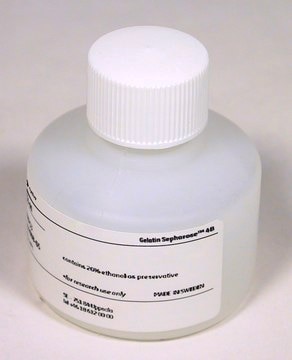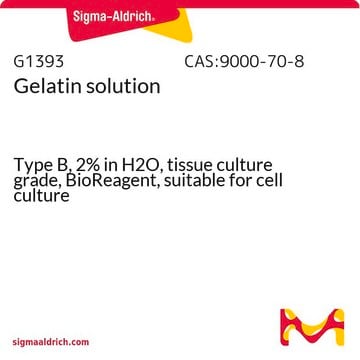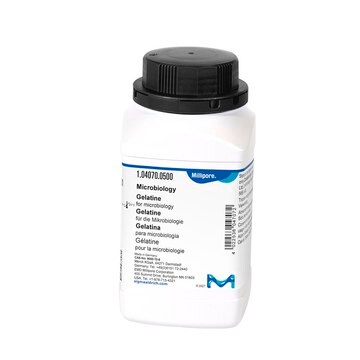G5384
Gelatin-Agarose
saline suspension
Se connecterpour consulter vos tarifs contractuels et ceux de votre entreprise/organisme
About This Item
Produits recommandés
Source biologique
protein from Porcine skin
Forme
saline suspension
Ampleur du marquage
≥3 mg per mL
Matrice
cross-linked 4% beaded agarose
Activation de la matrice
cyanogen bromide
Fixation de matrice
amino
Espaceur de matrice
1 atom
Température de stockage
2-8°C
Application
Gelatin-Agarose has been used:
- in the isolation of exosomes from human plasma
- to obtain fluorescent labeled enzyme For fluorescence photobleaching recovery (FPR) experiments
- in the purifaction of matrix metalloproteinase-9 by affinity chromatography
Gelatin-agarose is an agarose in saline suspension used for affinity chromatography, protein chromatography and specialty resins. Gelatin-agarose has been used in studies informing pathology-related processes of tissue remodeling as well as sperm-egg interactions in mammals.
Forme physique
Suspension in 0.5 M NaCl containing preservative
Code de la classe de stockage
10 - Combustible liquids
Classe de danger pour l'eau (WGK)
WGK 3
Certificats d'analyse (COA)
Recherchez un Certificats d'analyse (COA) en saisissant le numéro de lot du produit. Les numéros de lot figurent sur l'étiquette du produit après les mots "Lot" ou "Batch".
Déjà en possession de ce produit ?
Retrouvez la documentation relative aux produits que vous avez récemment achetés dans la Bibliothèque de documents.
Les clients ont également consulté
G A Piazza et al.
The Biochemical journal, 262(1), 327-334 (1989-08-15)
Dipeptidyl peptidase IV (DPP IV) is a cell surface glycoprotein which has been implicated in hepatocyte-extracellular matrix interactions [Hixson, DeLourdes, Ponce, Allison & Walborg (1984) Exp. Cell Res. 152, 402-414; Walborg, Tsuchida, Weeden, Thomas, Barrick, McEntire, Allison & Hixson (1985)
Mélanie Boisvert et al.
Biology of reproduction, 70(3), 656-661 (2003-10-31)
Bovine seminal plasma (BSP) contains a family of major proteins designated BSP-A1/A2, BSP-A3, and BSP-30kDa (collectively called BSP proteins) that bind to sperm at ejaculation and potentiate sperm capacitation. Homologous proteins have been identified in stallion, boar, goat, and ram
Substrate Recognition by Gelatinase A: The C-Terminal Domain Facilitates Surface Diffusion
Ivan EC, et al.
Biophysical Journal, 81(4), 2370-2377 (2001)
R P Kitson et al.
Journal of immunology (Baltimore, Md. : 1950), 160(9), 4248-4253 (1998-05-09)
We have previously documented that adoptively transferred IL-2-activated NK (A-NK) cells can accumulate within cancer metastases. Electron microscopic studies of pulmonary metastases have revealed that adoptively transferred A-NK cells that accumulate within metastases bind to endothelial cells and are able
Annick Bergeron et al.
Molecular reproduction and development, 71(4), 461-470 (2005-05-14)
Mammalian seminal plasma contains among others, two major families of proteins, namely spermadhesins and those proteins that contain fibronectin type II domains. Spermadhesins are the major proteins of boar and stallion seminal plasma and homologous proteins have been identified in
Notre équipe de scientifiques dispose d'une expérience dans tous les secteurs de la recherche, notamment en sciences de la vie, science des matériaux, synthèse chimique, chromatographie, analyse et dans de nombreux autres domaines..
Contacter notre Service technique












